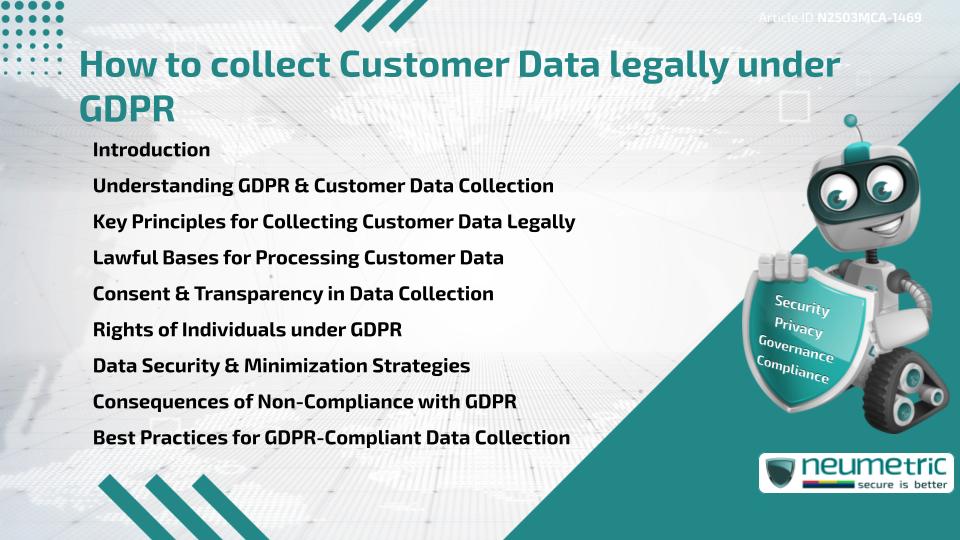Table of Contents
ToggleIntroduction
Collecting Customer Data is essential for businesses to improve services, personalize experiences & enhance decision-making. However, under the General Data Protection Regulation [GDPR], Organisations must follow strict guidelines to ensure the legal & ethical collection of Personal Data. Failing to comply can result in heavy penalties & loss of Customer trust. This article explains How to collect Customer Data legally under GDPR while balancing business needs & Privacy rights.
Understanding GDPR & Customer Data Collection
The General Data Protection Regulation [GDPR] is a European Union [EU] law that governs how Organisations collect, process & store Personal Data. It applies to any business that handles data of EU residents, regardless of location. Personal Data includes names, email addresses, phone numbers & even online identifiers such as IP addresses.
Key Principles for Collecting Customer Data Legally
Organisations must adhere to GDPR’s fundamental principles when gathering Customer Information. These principles ensure that data collection remains lawful, fair & transparent.
- Lawfulness, Fairness & Transparency – Businesses must inform users about why & how their data is collected.
- Purpose Limitation – Data should only be collected for specified & legitimate purposes.
- Data Minimization – Only necessary data should be gathered to reduce Risks.
- Accuracy – Businesses must ensure that collected data is up-to-date & correct.
- Storage Limitation – Data should not be retained longer than necessary.
- Integrity & Confidentiality – Organisations must protect data against unauthorized access or breaches.
Lawful Bases for Processing Customer Data
GDPR provides six (6) legal bases for collecting & processing Customer Data:
- Consent – The User must give clear, informed consent before data collection.
- Contractual Necessity – Data processing is required to fulfill a contract.
- Legal Obligation – Organisations must process data to comply with legal requirements.
- Vital Interests – Data is processed to protect someone’s life.
- Public Interest – Processing is necessary for public tasks or official authority.
- Legitimate Interests – Businesses can collect data if they prove the necessity & minimal Privacy impact.
Consent & Transparency in Data Collection
Consent plays a crucial role in GDPR Compliance. Businesses must ensure that consent is:
- Freely given – Users should not be forced to provide data.
- Specific & informed – The purpose of data collection must be clear.
- Unambiguous – Consent must involve a clear affirmative action, such as clicking an “Accept” button.
- Easily withdrawable – Users must have the option to withdraw consent at any time.
Additionally, Organisations must provide Privacy Policies that explain how Customer Data is used, stored & protected.
Rights of Individuals under GDPR
GDPR grants individuals several rights regarding their data, including:
- Right to Access – Customers can request details on how their data is processed.
- Right to Rectification – Users can request corrections to inaccurate information.
- Right to Erasure – Also known as the “right to be forgotten,” customers can request data deletion.
- Right to Restrict Processing – Users can limit how their data is used.
- Right to Data Portability – Customers can transfer their data to another service.
- Right to Object – Users can object to data processing under certain circumstances.
Data Security & Minimization Strategies
To comply with GDPR, businesses should adopt strong Security Measures & collect only essential data. Recommended strategies include:
- Encryption – Protects data by converting it into unreadable formats.
- Anonymization – Removes identifiable details from datasets.
- Access Controls – Restricts data access to authorized personnel only.
- regular Audits – Ensures Compliance & identifies potential Vulnerabilities.
- Data Minimization – Avoid collecting unnecessary Personal Information.
Consequences of Non-Compliance with GDPR
Failing to comply with GDPR can lead to severe penalties, including:
- Fines of up to €20 million or 4% of annual global revenue, whichever is higher.
- Legal actions & reputational damage.
- Restrictions on Business Operations, such as bans on data processing.
Best Practices for GDPR-Compliant Data Collection
To ensure Compliance while collecting Customer Data, businesses should:
- Obtain clear, verifiable consent before data collection.
- Use simple, user-friendly Privacy Policies.
- Allow customers to access, modify or delete their data easily.
- Secure data through encryption & Access Controls.
- Conduct regular GDPR Compliance audits.
Takeaways
- GDPR requires businesses to collect Customer Data transparently & lawfully.
- Organisations must follow GDPR principles, including data minimization & consent.
- Businesses should use legal bases such as consent, contractual necessity or legitimate interest.
- Customers have rights over their data, including access, rectification & erasure.
- Strong security practices & Compliance audits help avoid GDPR violations.
FAQ
What is GDPR & who does it apply to?
GDPR is an EU law that regulates Personal Data collection & processing. It applies to any organisation handling data of EU residents, regardless of location.
How can businesses collect Customer Data legally under GDPR?
Businesses must obtain clear consent, use a legal basis for data collection & follow GDPR principles such as transparency & data minimisation.
What happens if a company violates GDPR?
Non-Compliance can result in heavy fines, legal consequences & reputational damage. In severe cases, businesses may be banned from processing data.
Do customers have the right to delete their data?
Yes, under GDPR, individuals can request data deletion through the “right to be forgotten,” unless legal or contractual obligations prevent it.
How should businesses handle consent for GDPR Compliance?
Consent must be freely given, specific, informed & unambiguous. Users should also have the option to withdraw consent at any time.
What are the key Security Measures for GDPR Compliance?
Businesses should use encryption, Access Controls, anonymization & regular security audits to protect Personal Data.
Is GDPR Compliance necessary for businesses outside the EU?
Yes, if a business collects or processes the data of EU residents, it must comply with GDPR regulations.
Need help?
Neumetric provides organisations the necessary help to achieve their Cybersecurity, Compliance, Governance, Privacy, Certifications & Pentesting goals.
Organisations & Businesses, specifically those which provide SaaS & AI Solutions, usually need a Cybersecurity Partner for meeting & maintaining the ongoing Security & Privacy needs & requirements of their Clients & Customers.
SOC 2, ISO 27001, NIST, HIPAA, HECVAT, EU GDPR are some of the Frameworks that are served by Fusion – a centralised, automated, AI-enabled SaaS Solution provided by Neumetric.
Reach out to us!





